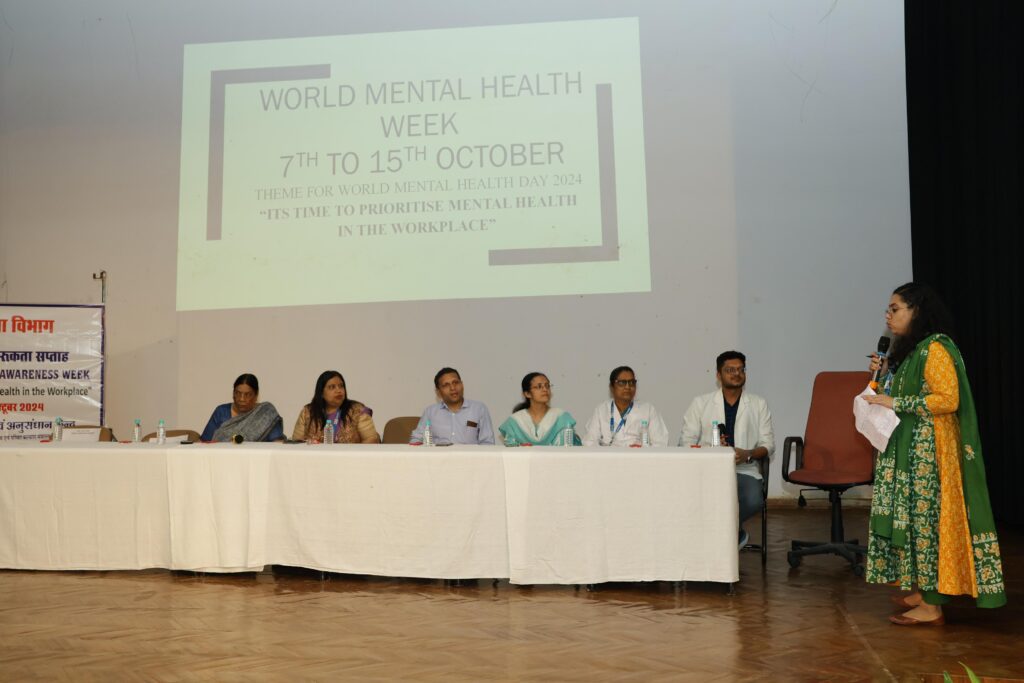
Dr. Manisha Shrivastava, Director-in-Charge of Bhopal Memorial Hospital and Research Centre (BMHRC), shared her personal strategies for managing a demanding role during a panel discussion on overcoming workplace stress.
The event was part of World Mental Health Week, organized by the Department of Psychiatry at BMHRC from September 7 to 15. Dr. Shrivastava emphasized the importance of effective time management and maintaining a structured approach to work, especially for those in leadership positions where responsibilities are heavy and time is limited.
In her approach, she follows specific rules to stay organized and avoid stress. She always carries a diary where she lists tasks that need to be completed. Dr. Shrivastava makes it a point not to leave tasks unfinished and ensures that all pending files are addressed before leaving the office. This method, she explained, helps her stay on top of her work and reduce stress from unfinished business.
The panel discussion featured several other distinguished speakers, including Dr. Krishna Jain, Chief Medical Officer of the Indian Institute of Science and Environment Research (IISER), Dr. Sandeep Sorte, Head of the Department of Neurosurgery at BMHRC, Dr. Sarika Katiyar, Head of the Department of Emergency Medicine, Nursing Superintendent Sheeba Rani Kalesh, and Dr. Yug, President of the Junior Doctors Association.
During her address, Dr. Shrivastava also touched on the significance of social support in stress management. She highlighted how essential it is to have good friends, both at work and in personal life, as they serve as a valuable resource in managing stress. Moreover, Dr. Shrivastava stressed the importance of mutual respect in the workplace. According to her, treating both seniors and juniors with respect can foster a positive work environment, reducing stress for everyone.
Dr. Krishna Jain, another panelist, brought attention to the impact of factionalism in the workplace as a major source of stress. In his view, internal divisions and group politics can create a toxic work environment, leading to increased pressure on employees.
Dr. Sandeep Sorte, Head of Neurosurgery, shared his own challenges in managing stress. He explained that one of the most stressful aspects of his job is meeting the expectations of patients and their families. Often, families expect immediate surgical intervention once a patient is admitted, but due to the complexity of neurosurgery, this is not always feasible. These unrealistic expectations can create tension and stress for both the medical team and the family.
Dr. Sarika Katiyar, Head of the Department of Emergency Medicine, shared a different perspective on stress management. She revealed that engaging in academic work helps her alleviate stress. Whenever she feels overwhelmed, focusing on academic-related tasks allows her to shift her mind away from stress and toward something she enjoys.
Similarly, Dr. Yug, President of the Junior Doctors Association, offered his approach to stress management, which includes meditation. Before starting his day at the hospital, Dr. Yug practices meditation, a technique he finds effective in clearing his mind and preparing himself for the challenges ahead.
In addition to the insightful panel discussion, the event featured a meditation session, allowing participants to practice mindfulness as a tool for stress relief. Moreover, the students of Nursing College staged a play focusing on mental health in the workplace, offering a creative and thought-provoking exploration of the issue.




